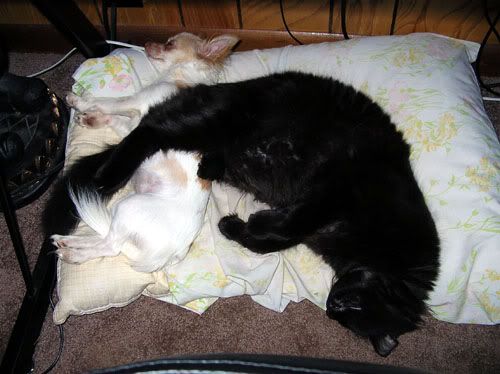Whatever you do, don't let the dog pee in the house.

Why not? Both my dogs are pad-trained so they pee in the house all the time, but on a pad, of course. It is a legitimate house-breaking option for many toy breeds. My adult cat does not care, and the kittens are in the process of being trained not to care either, which is working great. Another week, and they'll ignore the pads as well. They are already tiring of it. Otherwise, what you say is great, though a bit fast. The process, IMO, should take more time. They really shouldn't even see each other yet. The key is to let the established pet remain established. It is the new pet that should be isolated for a while. I kept my kittens in a separate bathroom for quite a while before they were introduced to my adult Pomeranians and Turkish angora. The established pets will then be allowed to get used to the smell of the new animal before even seeing it. Trust me, they'll be able to smell it. If you get a puppy, once it has had its first boosters, then take it out, supervised, around the house. This avoids bullying by the other pets and teaches the new pet to respect the other pets' domains. Never push them close, face to face at first. Cats and dogs do not communicate in the same way and a cat could misintepret a dog's playfullness for agression and the claws will unsheathe, pissing off the dog. It may seem cute to watch a puppy chase around cats, but until you know that it
is actually play behavior, it's something to avoid at first. Once it is old enough, then it can be released, but firm boundaries must be established of what is tolerable behavior. I also used the same method when I introduced Cici to Lily, my eldest established pet, and all my pets get along well. The process is similar for an older, rescued dog, but can go faster, as an adult dog's immune system is stronger, and have also lost some of their puppy-braindamagedness.

My dogs and cats now chase each other, but their body language tells me that this is all in fun. They even take naps together, especially my younger kittens and the dogs. They are, however, an exception since they were raised around these dogs since day 8. More than likely, you'll get a level of tolerance that is similar to my Turkish angora's reaction to the dogs. She is seven now and doesn't trouble herself with the dogs. She looks down on them and the kittens in her typical queenly fashion. She is not aggressive, however, and the dogs respect her space.
Just another thing to consider. No biggy, but it might need a little training. Sometimes, male dogs like to eat cat poop. Not kidding, my sister's Pom used to eat Lily's, the Turkish angora's, poop.

After some training, however, he no longer does this and does not venture near the multiple litter boxes I know have. Toys are smart, super smart, too smart for their own good sometimes. You have to be firm with their training, or they end up running the show. They are awesome pets. Good luck!
llj







 After some training, however, he no longer does this and does not venture near the multiple litter boxes I know have. Toys are smart, super smart, too smart for their own good sometimes. You have to be firm with their training, or they end up running the show. They are awesome pets. Good luck!
After some training, however, he no longer does this and does not venture near the multiple litter boxes I know have. Toys are smart, super smart, too smart for their own good sometimes. You have to be firm with their training, or they end up running the show. They are awesome pets. Good luck!